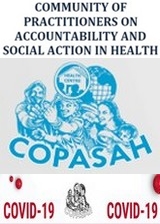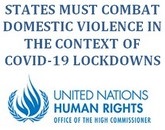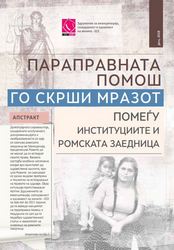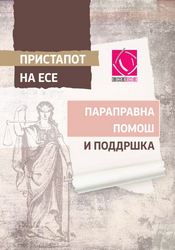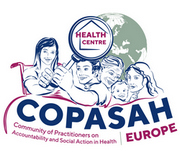The progressive exercise of social and economic rights is closely related to promotion and establishment of effective access to justice for marginalized and vulnerable population groups in the society.
ABOUT THE ISSUE
On global level, data show that 4 billion people around the world live outside the protection of the law, mostly because they are poor or marginalized. There are numerous deficiencies that need to be corrected, both on the side of supply, i.e. providers of services, and on the side of demand, i.e. beneficiaries of services. Some of these deficiencies are well known and they include: distance from places where this type of services are provided; social status and relations concerning their legal needs and resolution thereof; costs related to service provision; lack or absence of sufficient capacity for provision of necessary services, and digital divide.
Our country is not an exception from global state-of-affairs. Republic of Macedonia is a state with upper middle income. In 2015, according to data from the State Statistical Office (Survey on Income and Living Conditions) the poverty rate stood at 21.5%. The single national survey in Macedonia that inquired about legal needs (Srbijanko et al., 2013.) has shown that almost half of respondents (49%) had experienced at least one legal problem in the last three years and that majority of those that reported such problems have faced more than one legal problem in the indicated period.
Two thirds of those that reported problems also indicated that they have taken steps to have these problems resolved. In particular, one third of them sought legal advice to have the problem solved. Two-thirds of respondents that sought legal advice had to pay for such services. One fifth of those that reported problems also indicated that they have not taken any action due to lack of funds. Hence, poor people, youth and ethnic Albanians are the least likely to take any action to have their legal problems resolved. More than half of those that have not taken any action to resolve their problem indicated distrust in availability of assistance as the main reason thereof. Less than 10% of those that have faced legal problems were also involved in some form of court procedure related to the problem.
The link between access to justice, exercise of human rights and development is duly underlined in the UN Sustainable Development Goals adopted in 2016. Notably, as a result of the need and the effort made at international level, the United Nations introduced a separate Sustainable Development Goal No.16 that focuses on peace, justice and strong institutions, accompanied by SDG No.16.3: promote the rule of law at national and international level and ensure equal access to justice for all.
In the latest Rule of Law Index for 2020, the World Justice Project ranks our country 58th in terms of adhering to the basic democratic values and principles of the rule of law. At the same time, the Rule of Law Index is considered to be a leading source of original and independent data on the rule of law in states around the world.
According to the 2020 Index, there is no improvement in the rule of law in the Republic of North Macedonia and it is concerning that there is regress in certain factors, such as tackling corruption and openness of the Government. The situation has not improved in the other areas of the rule of law as well, such as: limitations on government power, enforcement of regulations, civil and criminal justice. The only slight improvement is in the area of fundamental human rights, while the area of public order and peace is consistently ranked the best.
The Rule of Law Index provides data on the rule of law in 128 countries around the world, by ranking or evaluating 8 relevant rule of law factors: limiting government power; absence of corruption; open government; fundamental rights; order and peace; implementation of the regulation; civil justice and criminal justice. The Rule of Law Index 2020 incorporates data from 130,000 households and 4,000 experts worldwide.
More information on the following link https://worldjusticeproject.org/
WHAT WE DO ABOUT THIS ISSUE
We work on capacity building for civil society organizations related to provision of paralegal assistance to poor and vulnerable population groups. Having recognized the importance of improved access to justice, in the last years Association ESE has made specific efforts to increase access to justice for different vulnerable groups. Due to discrimination against and marginalized position of Roma people in exercise of their right to health, in cooperation with several Roma CSOs from Shuto Orizari, Delchevo, Pehchevo and Vinica, we have introduced provision of paralegal assistance and support. In particular, paralegal assistance and support for exercise of rights in the field of healthcare, health insurance and protection of patients’ rights has resulted in Roma people gaining knowledge of and exercising their health-related rights, i.e. obtain health insurance; receive necessary healthcare services; benefit from law-stipulated free healthcare and services; obtain necessary orthopaedic and/or other medical aids; have their health costs reimbursed; payment of law-stipulated participation fee for healthcare services; exercise their law-stipulated rights as patients; obtain access to medicines from the positive list, etc.
We gather evidence on the need for provision of legal assistance by CSOs for resolution of legal needs faced by poor and vulnerable population groups and we secure evidence on the need for facilitated access to justice. Association ESE works on promotion and integration of the UN Sustainable Development Goals, in particular SDG 16.3: promote the rule of law on national and international level and ensure equal access to justice for all. Under leadership from the Coalition “Margins”, we have conducted a preliminary assessment of state-of-affaires related to implementation of this development goal in our country and identified obstacles for full implementation and compliance thereto, as follows: insufficient information and knowledge about this development goal among public institutions, civil society organizations and judicial system; lack of and failure to plan systemic reforms or mechanisms to monitor implementation of this development goal; lack of official data on access to justice for different vulnerable population categories; State Statistical Office does not collect sufficient data on implementation of sustainable development goals, etc.
As regards collection of evidence on access to justice, in continuity, Association ESE has worked on data collection and analysis about costs and benefits related to different modalities on provision of legal assistance by CSOS in our country. In addition to costs incurred by CSOs for provision of legal assistance, we collect and analyse data about costs incurred by persons who have legal problems and have sought assistance, i.e. costs they have to settle from their own pocket.
Furthermore, we have analysed the exercise of the impecunious law, i.e. the right to exemption from payment of court administration fees and charges for women who have suffered violence, in order to facilitate their access to justice.
We improve legal protection for women who have suffered violence. In continuity, Association ESE provides legal assistance, free-of-charge court representation and psychological assistance and support to women who have suffered violence. Psychological empowerment of women who have suffered violence is necessary for them to actively participate in problem resolution and to escape the violent partnerships they are part of. Our legal assistance and support has allowed women to successfully initiate and lead divorce procedure and children custody lawsuits, as well as litigation and criminal proceedings on protection against domestic violence.
In addition to traditional provision of assistance and support, Association ESE also monitors court cases related to violence against women and conducts comprehensive analyses of the legal framework and institutional reaction to violence against women in the country. In that, all efforts on analysis of laws and actions taken by competent institutions include consultations with and involvement of women who have suffered violence, thereby ensuring that recommendations put forward reflect their actual needs.
Main findings from monitoring of court cases underline shortfalls in the system of court protection in cases related to violence against women, which include insufficient legal protection of women who are victims of violence; insensitivity and insufficient knowledge among judges about the nature of violence against women; lack of state funds to indemnify victims of violence; non-existence of separate register at courts for domestic violence cases; postponement of court proceedings; low level of motions for litigation proceedings related to protection against domestic violence and lenient policy of sanctions against perpetrators of domestic violence. Data from monitoring of court cases indicate to existence of numerous and various aspects that contribute to re-victimization of women, for example: victims are required to repeat their statement at main hearings, instead of having their statements made in the course of investigation proceedings read at courts; make depositions in the presence of perpetrators; failure to take specific actions to protect victims as witnesses, etc. Together with judges, Association ESE works to address identified shortfalls in the system of court protection and advocates before competent ministries for improved legal regulations and institutional response to violence against women.




